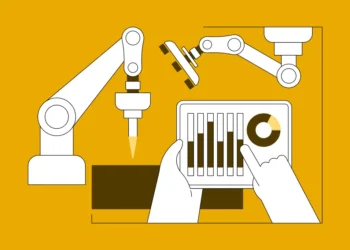Let’s be honest, starting a construction business today is not just about laying bricks and pouring cement. It’s about managing chaos. Multiple sites run simultaneously, teams are scattered across locations, deadlines are breathing down your neck, and budgets seem to stretch thinner by the day.
In all this, if you are still dealing with Excel spreadsheets, phone calls, or whiteboards to coordinate operations, you are constructing your dreams on weak foundations.
Which is why increasing numbers of construction start-ups, particularly in tech-savvy cities such as Bangalore, are adopting ERP software development as a way of creating an electronic backbone to their business. In an age going at 5G pace, you cannot afford to do business at 2G speed.
What is ERP Software? (And Why It’s Not Just for Big Companies)
ERP, or Enterprise Resource Planning, is one of those technology buzzwords that sounds high-tech but is pretty simple when you dissect it.
Picture all of the departments in your business, project management, inventory, finance, HR, and procurement, being components of one machine. ERP is the operating system that keeps the machine running smoothly, ensuring each component is aware of what the others are doing in real time.
You don’t have to have five separate apps, ten separate spreadsheets, and daily phone calls to check status. With ERP software, it all resides on one platform. From issuing a purchase order to monitoring on-site worker attendance to receiving notifications when budgets are going to be violated, you have control without chaos.
Why Construction Startups Should Prioritize ERP from Day One

You may say, We’re a small group, we can do things manually for now. It’s reasonable, but this is the catch: by the time your organization expands and projects increase, the disorganization does too. Startups that adopt ERP early don’t merely expand faster, they expand more intelligently.
1. Complexity Comes Early
Even with 2-3 projects in progress, you’re already coordinating subcontractors, monitoring raw materials, processing invoices, and delivering customer timelines. ERP organizes this mess right from the beginning.
2. Save Money on Costly Blunders
Manual mistakes, late deliveries, ordering more material than needed, or double billing—these silently burn money. ERP allows transparency and minimizes the scope for errors.
3. Improved Customer Experience
You can send clients real-time progress reports, billing reports, and timelines, presenting yourself as professional and dependable, even if you’re a startup.
Benefits of ERP Systems in the Construction Industry

Now, let’s deconstruct the actual advantages of using ERP software within your construction startup. Not theory notability, practical things you’ll experience once the ERP is installed.
1. Centralized Project Management
With ERP, you can see the status of each project in real-time, from initiation to handover. Design approvals, on-site activities, pending procurement, or labor allocations, nothing is hidden from view under one roof.
Consider this: You log in and within 5 minutes, you know where every project is at, who is doing what, what is pending, and what needs your urgent attention. No running around for updates, no endless WhatsApp conversation.
2. Smarter Resource Management
Building is capital-intensive labor, machinery, and materials. If you can’t keep tabs on who’s working with what, where, and why, you’re losing money. ERP makes sure every sack of cement, every rented crane, and every labor hour is tracked, billed, and accounted for.
3. Finance & Cost Control
Budgeting in building isn’t a choice—it’s survival. ERP provides cost estimates, compares actual vs budget spend, alerts when spending goes over limits, and assists in projecting future project costs.
4. Real-Time Inventory Tracking
Surprise stockouts and overbuying are a thing of the past. ERP allows you to maintain just the right level of materials at the right location at the right moment. And when procurement needs come up, it can auto-create purchase orders based on historical consumption patterns.
5. Better Compliance and Reporting
Whether it’s labor legislation, GST, safety standards, or contract milestones, ERP keeps it all on file. You’ll spend less time chasing paper and more time on actual implementation.
Important Features of ERP Systems/Software for the Construction Sector in 2025

If you’re selecting an ERP in 2025, you’re not merely purchasing a tool, you’re selecting a partner for business growth. So, here’s what your ERP software needs to have:
1. Cloud-Native Platform
Work does not occur solely within offices any longer. Your ERP must be operable from site offices, smartphones, laptops, and even with spotty internet. Cloud-enabled systems guarantee real-time synchronization across teams, locations, and devices.
2. Modular & Scalable Architecture
You may not require every feature presently. A solid ERP allows you to begin with the basics and expand rapidly. You may include payroll modules, subcontractor management modules, or mobile inspection modules as operations expand.
3. AI-Based Analytics
Future-ready ERPs offer smart dashboards that don’t just show numbers, they tell stories. For example: “Project X is likely to get delayed due to slow inventory movement,” or “Budget Y is likely to get overshot in 12 days if current spending continues.”
4. Integration Capabilities
Can your ERP talk to your accounting software? Your HR tool? Your vendor systems? Choose software that plays well with others, so you’re not stuck between silos.
5. Mobile-First UX
Field personnel and site supervisors won’t utilize ERP if it’s not user-friendly. Select a system with a neat, easy-to-use mobile app that supports task status updates, image uploads, material postings, and more—all from the field.
Best ERP Software Options for Construction Startups

Now that you’re sold on why ERP matters, the next big question is which one? There are tons of options out there, but let’s narrow it down to what suits construction startups in Bangalore.
Here’s a mix of ready-made tools and companies that offer ERP software development in Bangalore for construction businesses.
1. BuildSmart
Designed specifically for construction, BuildSmart is an ERP that’s cloud-based and spans from tendering through to final handover. It’s perfect for startups that require end-to-end visibility and robust cost control capabilities.
Why use it?
Because it’s construction-specific, not another generic ERP.
2. Tally Prime with Custom Construction Modules
Tally is a favorite in Indian companies for finance, but did you know that you can custom-develop construction modules over it? Some ERP software developers in Bangalore provide this as a cost-effective solution for startups.
Best for: People who need solid accounting + construction features without splurging the cash.
3. NevasTech ERP for Construction
NevasTech has a robust set of modules, such as project estimation, contract administration, billing, and resource monitoring. It’s contemporary, mobile-friendly, and ideal for distributed teams.
What makes it ideal?
It’s modular, thus you only pay for what you need.
4. Custom ERP Software Development in Bangalore
If you desire something customized, then there are a few established ERP development company in Bangalore that deal in the construction industry. They will design software around your very process, not the other way around.
How to Select the Correct ERP Software Development Partner

The correct software can revolutionize your business. But the correct ERP software development partner can either make or destroy the software itself.
Here’s how to find it:
- Domain Knowledge: Pick a person who gets construction, not software. You shouldn’t need to explain site progress to them.
- Customization & Scalability: Will the ERP scale with your business? Are they able to change modules in the future?
- Post-Implementation Support: Software requires adjustments, patches, and hand-holding early on. Get a partner that remains after go-live, not one that flees.
- UI/UX Simplicity: If your on-site engineers don’t understand the app, they will not use it. Period. Request a demo and have your team try it out first.
ERP Implementation Tips for Construction Startups
ERP implementation is not a matter of plugging in a system, it’s rewriting the way your business operates. So do it step by step:
- Begin with the basics: Don’t start with 20 modules. Begin with 4-5 fundamentals: project tracking, procurement, finance, and inventory.
- Train the staff: Regardless of how great the software is, if no one uses it, it is useless.
- Select a place to pilot: Pilot it on one site, repair the holes, then scale up.
- Maintain feedback loops open: Your field staff will let you know what works and what does not. Listen to them.
Summary
We all know construction startups in 2025 don’t require only bricks and cement to build the best construction; they require clarity, control, and coordination, all under one roof. That’s what ERP software has to offer.
From coordinating material handling on-site to monitoring project timelines, minimizing labor expense to automating invoices, ERP ensures nothing gets left behind. And in a buzzing metropolis like Bangalore, where seconds matter and margins are thin, having the proper ERP solution can be the difference between a cash-strapped startup and a scalable venture.
We covered:
- Why ERP is important for construction startups
- The key benefits—cost management, automation of workflows, and real-time monitoring
- What to search for in a construction-centric ERP in 2025
- The top software solutions and ERP providers in Bangalore
- And how to do it the intelligent way, without burdening your team
In brief, if you mean business regarding growth, project completion, and beating your competitors, an ERP system isn’t software—it’s your quiet project manager, CFO, and operations head, all in one.
So before you embark on your next big project, ask yourself:
Is your backend as solid as your blueprint?
If not, it’s time to construct your digital foundation with ERP.

















